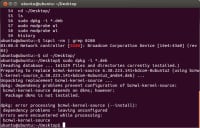Description
dpkg (Debian Package) is the software at the base of the package management system in the free operating system Debian and its numerous derivatives. dpkg is used to install, remove, and provide information about .deb packages. dpkg itself is a low-level tool. APT (Advanced Package Tool), a higher-level tool, is more commonly used than dpkg as it can fetch packages from remote locations and deal with complex package relations, such as dependency resolution. Frontends for APT, like aptitude (ncurses) and synaptic (GTK), are used for their friendlier interfaces.
The Debian package “dpkg” provides the dpkg program, as well as several other programs necessary for run-time functioning of the packaging system, including: dpkg-deb, dpkg-split, dpkg-query, dpkg-statoverride, dpkg-divert and dpkg-trigger. It also includes the programs such as update-alternatives and start-stop-daemon.
Usage [1]
To install a .deb package:
dpkg -i filename.deb
where filename.deb is the name of the Debian package (such as pkgname_0.00-1_amd64.deb).
The list of installed packages can be obtained with:
dpkg -l [optional pattern]
To remove an installed package:
dpkg -r packagename
Trobleshooting
Package Database Corrupted [2] [3]
If you run into conflits installing a package and running the apt command keeps producing errors, then the following steps may help repair your system.
Run, sudo dpkg --configure -a to try reconfiguring the dpkg database. This should produce a list of the software packages causing errors.
Now remove the packages causing issues by running, sudo dpkg --force-all -P <software packages> (listing all the software packages from the previous step).
Finally run sudo apt install -f and sudo apt autoremove to get back to a working state.
You should now be able to run sudo apt update && sudo apt upgrade without errors.
